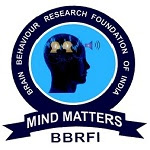Hallucinations in Everyday Life.
Our conscious experiences of the world around us, and of ourselves within it, are kinds of controlled hallucinations that happen with, through and because of our living bodies. Let us take, couple of examples for this. In the rubber hand example, a person's real hand is hidden from the view, and then fake rubber hand is placed in front of him. Then both hands are simultaneously stroke with a paint brush, while the person stares at the fake hand.
Now, for most of the people, after a while, this leads to the very uncanny sensation that the fake hand is in fact part of their hand. And the idea is that the congruence between seeing touch and feeling touch on an object that looks like a hand and is roughly where a hand should be, is enough evidence for the brain to make it's best guess that the fake hand is in fact part of the body.
Here is another example, which shows just how quickly the brain can use new predictions to change what we consciously experience. Just read to this ....."ithinkbrexitisaterribleidea....'. This makes no sense. Now read this " I think Brexit is a terrible idea. " So, you can read the words here but not in the above sentence though the sentence is same. Try again ......"ithinkbrexitisaterribleidea....". Now you can read this also.
Okay ! What is going on here ? The remarkable thing is the sensory information coming into the brain hasn't changed at all. Instead of perception depending largely on signals coming into the brain, from the outside world, it depends as much, if not more on perceptual predictions flowing in the opposite direction.
We don't just passively perceive the world, we actively generate it. So our experiences of the world around us, and ourselves within it, well they are kinds of controlled hallucinations that have been shaped over millions of years of evolution to keep us alive in worlds full of danger and opportunity. We predict ourselves into existence. Let us take one more example of perception, as this active, constructive process, using an algorithm based on Google's Deep Dream to stimulate the effects of overly strong perceptual perceptions predictions. In this example, to see dogs. The result looks very much like the kinds of hallucinations, people might report in altered states, or perhaps even in psychosis.
Now, think about this for a minute. If hallucination is a kind of uncontrolled perception, then perception right there and right now is also a kind of hallucination, but a controlled hallucination in which the brain's predictions are being reined by the sensory information from the world. In fact, we are all hallucinating all the time, including right now. It is just that when we agree about our hallucinations, we call that reality.
Source : Anil Seth
Cognitive Neuroscientist
through www.facebook.com/TED
Our conscious experiences of the world around us, and of ourselves within it, are kinds of controlled hallucinations that happen with, through and because of our living bodies. Let us take, couple of examples for this. In the rubber hand example, a person's real hand is hidden from the view, and then fake rubber hand is placed in front of him. Then both hands are simultaneously stroke with a paint brush, while the person stares at the fake hand.
Now, for most of the people, after a while, this leads to the very uncanny sensation that the fake hand is in fact part of their hand. And the idea is that the congruence between seeing touch and feeling touch on an object that looks like a hand and is roughly where a hand should be, is enough evidence for the brain to make it's best guess that the fake hand is in fact part of the body.
Here is another example, which shows just how quickly the brain can use new predictions to change what we consciously experience. Just read to this ....."ithinkbrexitisaterribleidea....'. This makes no sense. Now read this " I think Brexit is a terrible idea. " So, you can read the words here but not in the above sentence though the sentence is same. Try again ......"ithinkbrexitisaterribleidea....". Now you can read this also.
Okay ! What is going on here ? The remarkable thing is the sensory information coming into the brain hasn't changed at all. Instead of perception depending largely on signals coming into the brain, from the outside world, it depends as much, if not more on perceptual predictions flowing in the opposite direction.
We don't just passively perceive the world, we actively generate it. So our experiences of the world around us, and ourselves within it, well they are kinds of controlled hallucinations that have been shaped over millions of years of evolution to keep us alive in worlds full of danger and opportunity. We predict ourselves into existence. Let us take one more example of perception, as this active, constructive process, using an algorithm based on Google's Deep Dream to stimulate the effects of overly strong perceptual perceptions predictions. In this example, to see dogs. The result looks very much like the kinds of hallucinations, people might report in altered states, or perhaps even in psychosis.
Now, think about this for a minute. If hallucination is a kind of uncontrolled perception, then perception right there and right now is also a kind of hallucination, but a controlled hallucination in which the brain's predictions are being reined by the sensory information from the world. In fact, we are all hallucinating all the time, including right now. It is just that when we agree about our hallucinations, we call that reality.
Source : Anil Seth
Cognitive Neuroscientist
through www.facebook.com/TED

Comments
Post a Comment